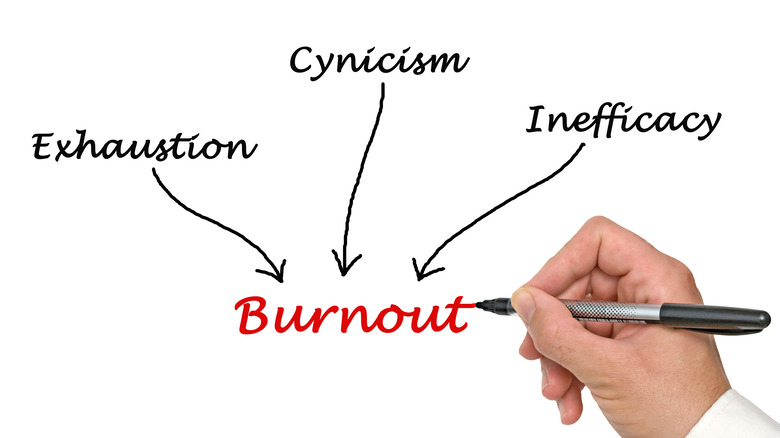Signs Of Burnout You Shouldn't Ignore
The topic of burnout has garnered a lot of attention recently. Often cited as the affliction of our modern times, burnout refers to "a special type of work-related stress — a state of physical or emotional exhaustion that also involves a sense of reduced accomplishment and loss of personal identity," explains the Mayo Clinic. An amalgam of symptoms erupts out of unhealthy working conditions such as excessively long hours, an overwhelming workload, or a toxic work environment.
Anyone can experience burnout at any point in their lives, but research shows that the average person hits the wall around age 32 (via Study Finds). Burnout has become a major health issue among frontline healthcare workers, with 43% reporting work overload and 49% experiencing burnout syndrome since the start of the pandemic, reports a 2021 study published by The Lancet. Women also report the highest rates of burnout while high achievers tend to be particularly vulnerable because of their perfectionism and high standards.
Burnout doesn't happen abruptly. It builds up slowly and incrementally over time, insidiously enveloping daily life in subtle but significant ways. "Burnout is a complex mechanism," Florence Cotel, neuroscientist and founder of BLiSS Science and Innovation Inc., tells Health Digest. The same symptoms can appear with many other diseases and ailments, which can make them easy to ignore or overlook. But your brain and body will warn you before burnout sets in and wraps its tendrils around you.
Exhaustion
Tiredness is a common feature of modern living for a lot of people. Fast-paced lifestyles, overpacked schedules, and looming deadlines can take a toll on your body clock and energy levels. But exhaustion is a whole other beast. "To be burned out is to be used up, like a battery so depleted that it can't be recharged," describes journalist Jill Lepore from The New Yorker.
Christine Maslach, a psychologist and creator of the first mainstream measure for burnout, proposed that exhaustion is one of the "three dimensions" of burnout along with cynicism and lack of professional efficacy (via Frontiers in Psychology). Maslach defined burnout as an "experience of exhaustion, where the individuals who suffer from it become cynical toward the value of their occupation and doubt their ability to perform."
In the early stages of burnout, your energy levels are likely to plummet, according to Winona State University's Stages of Burnout study. Some days you may wake up almost as tired as when you fell asleep. Intermittent tiredness will gradually progress into chronic fatigue and a steadily increasing feeling of dread about all of the demands and responsibilities that lie ahead. Completing tasks can feel like a drag, if not almost impossible, at times. When you hit the later stages of burnout, you'll feel mentally and physically drained. Exhaustion becomes almost habitual at this point. But the more you normalize it, the more it's embedded into your life and could potentially lead to a debilitating illness.
Cynicism and detachment from the job
Cynicism, also referred to as "depersonalization", is another key component of burnout syndrome, as identified by researcher Christine Maslach (via Frontiers in Psychology). It refers to an "apathetic or a detached attitude" toward one's job. Besides losing interest in something you were once deeply passionate about, you may start to feel increasingly disillusioned, unmotivated, and irritable at work. Some people even develop a negative or even inappropriate attitude towards their colleagues or clients, according to a study in World Psychiatry.
A sense of disappointment at work is an important sign of burnout that people shouldn't ignore, neuroscientist Florence Cotel tells Health Digest. This is essentially the feeling that you won't be able to achieve what you deeply care about, which is a major trigger for burnout syndrome, notes Cotel. If people can realize this early and start thinking about what could help them work through their disillusionment and get closer to their goal, they may be able to dodge the final stages of burnout where symptoms become critical and enmeshed into their lives (via Winona State University).
Carrying on as normal may feel more challenging as you inch closer towards burnout. If you feel like your job has lost its meaning and you're starting to withdraw and psychologically detach yourself from work, it may be time to seek support.
Trouble sleeping
Insomnia also features high on the list of prominent features of burnout. Many people dealing with burnout feel that their workload is so overbearing it affects their ability to fall or stay asleep at night, according to a Journal of Psychosomatic Research study (via ScienceDirect). In the initial stages of burnout, you may find that your mind is so preoccupied and cluttered that it's hard to switch off (via Winona State University).
Burnout and sleep disturbances are a double-edged sword. The stress of burnout can lead to insomnia while insufficient or poor quality of sleep can facilitate and contribute to the development of burnout over time. According to a 2017 study from BMJ Open, financial workers are more likely to experience burnout when job strain is coupled with insomnia. For this reason, the authors suggest that sleep deprivation — a clear risk factor for burnout — should be targeted in burnout prevention programs at the workplace.
A 2020 study highlighted that numerous work-related stressors can add to sleep troubles including prolonged work hours, competing demands, and professional dissatisfaction. Often people struggling with a sleep disorder (more than 90%) are unlikely to receive a diagnosis and treatment, which only makes the situation worse. If you're consistently unable to get some shuteye and habitually popping sleeping pills, you may be tumbling into the downward spiral of burnout. A few strategies that could help thwart sleep troubles from dragging into weeks or months include exercise, meditation, and prioritizing, notes Penn Medicine.
Depression
Burnout and depression may look and feel synonymous. Many of the symptoms of burnout mirror the characteristics of depression, including a low mood, fatigue, impaired concentration, decreased or increased appetite, a sense of failure, and anhedonia, namely a loss of pleasure or interest in things, according to a study in Frontiers in Psychology.
Unlike depression, burnout isn't listed in the DSM-V diagnosis manual for psychological diseases, which raises some confusion about whether these two illnesses are different sides of the same coin. Some researchers argue that while burnout and depression are distinct mental health conditions, they are not entirely independent of one another either and can exacerbate the other, according to a report in World Psychiatry.
Burnout and depression are considered separate constructs with some overlap in terms of symptoms (via Frontiers in Psychology). Burnout is a work-specific syndrome whereas depression is context-free and doesn't always tie in with job-related challenges. It's not unusual to feel down when work demands become staggering, but it's important not to turn a blind eye to persistently depressive symptoms that arise such as feelings of loneliness and hopelessness, which can sometimes elicit passive or even active suicidal ideation, James Overholser, a researcher and professor of psychology at Case Western Reserve University, told Refinery29. These types of thoughts don't necessarily mean you're going to harm yourself, but they have the potential to act as a starting point for suicidal behavior and shouldn't go ignored.
If you or someone you know is struggling or in crisis, help is available. Call or text 988 or chat
Muscle pain
Burnout isn't just a psychological phenomenon — it can have some major physical consequences that impact your wellbeing too. One of the main bodily signals of burnout is muscle pain, often accompanying the fatigue that emerges fairly early on in the development of burnout (via Winona State University). Tension is a natural physiological response to stress — also known as the fight or flight response — which gears the body up for confronting or escaping an imminent threat (via American Psychological Association). When you're chronically stressed, your muscles are constantly tense and unable to rest. You may find yourself clenching your jaw, grinding your teeth, or stiffening your shoulders on a regular basis without even realizing it (via Journal of Clinical Medicine).
Musculoskeletal pain is a common ailment reported by people struggling with severe burnout (defined as a daily occurrence of burnout symptoms), according to research from the journal PLoS One. During the early phases of burnout, sufferers are often plagued with neck-shoulder pain, back pain, and pain-related disability. Pain in the lower and upper back, in particular, has been linked to job stress, notes the American Psychological Association. But luckily, there are a number of stress-relieving techniques and relaxation exercises that can effectively reduce muscle tension if you've been dealing with persistent pain due to burnout (via Verywell Health).
Feelings of ineffectiveness
A sense of ineffectiveness has become central to the definition of burnout (via World Psychiatry). An individual may feel as though their skills and abilities are slipping away. They can struggle to accomplish even the most basic tasks. These feelings often surface in tandem with exhaustion and cynicism, making it hard for you to function properly. As people descend further into burnout, they often see a considerable decline in morale and productivity. A diminished sense of efficacy has been linked to "insufficient recognition and reward," which can leave people feeling devalued and increase their susceptibility to burnout.
Feelings of inefficacy can crop up in everyday situations and at various stages of a person's life, but when these thoughts and emotions become persistent and start to affect your sense of self-worth and wellbeing, it's important to take some action to address the situation. Exercising self-care and talking to a healthcare professional can be important first steps towards recovery, says the American Psychological Association.
Stomach problems
It's not unusual for people with burnout to experience stomach problems like abdominal pain, gassiness and bloating. Researchers have pinpointed a strong relationship between job stress and gastrointestinal and digestive issues like peptic ulcers, gastroesophageal reflux disease (GERD), and, particularly, irritable bowel syndrome, which is a chronic condition that affects the large intestine, per a report in World Journal of Gastrointestinal Pathophysiology.
Studies have shown that people in stressful roles are significantly more likely to report multiple health problems, in particular stomach-related issues. This is due to the fact that our guts are in perpetual communication with our brains. So any stress that we experience can alter the body's gut microbiota composition, in turn, impacting our physical and mental health, including the way we think and feel (via The Journal of Physiology).
Stress also weakens the intestinal barrier, also known as "leaky" gut syndrome, whereby particles like undigested food and unhealthy bacteria easily cross over into the bloodstream, triggering chronic inflammation over time.
Headaches
Headaches are another common outcome of burnout syndrome. They tend to go hand-in-hand with muscular tension, which is heightened when we're feeling stressed out. In fact, chronic muscle tension in the neck, shoulders, and head, can often generate tension-type headaches and migraine headaches, as reported by the American Psychological Association. A 2017 systematic review in PLoS One showed that burnout is a predictor of 12 main somatic diseases, one of which is burnout-related headaches, which can be attributed to psychological stress.
Burnout can bring on headaches for a number of other reasons too. For instance, when people are under stress, they tend to sleep less and eat poorly, often skipping meals or bingeing on comfort foods, which can throw their blood sugar levels off-kilter (via PLoS One). We also become more sedentary than usual when stress is mounting up. Four out of five people report experiencing migraines as a result of stress, according to the American Headache Society. This is usually more severe than headaches and can be experienced as a pulsing or throbbing pain on one or both sides of the head.
Struggling to make decisions
It's pretty common for people to report cognitive impairments in burnout, according to a review in PLoS One. This can manifest in a wide spectrum of ways including difficulties with attention, concentration, and memory. Some people find themselves struggling to hold a thought. They may experience a sort of mental block and a generalized sense of inefficacy when attempting to take on tasks. Researchers suggest that deficits in working memory could be at the root of many of the cognitive roadblocks associated with burnout.
The indecisiveness and brain fog that people grapple with when overrun by job stress is called "decision fatigue," according to an analysis in the Journal of Health Psychology. The term was coined by Dr. Roy F. Baumeister. It's structured around the idea of "ego depletion," which claims that when people use up most of their limited mental resources and reach a point of exhaustion, they notice an effect on other cognitive capacities and processes such as decision-making. This is often observed in mentally and emotionally demanding positions such as in healthcare. On the other hand, a continuous battle to focus and the consistent inability to make choices might be a sign that you're overly stressed and need to recharge your mental battery.
Forgetfulness
You may be wondering why you keep forgetting or losing things recently. Well, burnout is a pretty common culprit of memory lapses, explain researchers (via ScienceDaily). Many people — often educated professionals between the ages of 50 and 60 — report forgetfulness and absentmindedness due to being overworked. When checked at the hospital for any potential cognitive problems, they appear to be perfectly healthy, and yet being in a stressful work environment with a conveyor belt of demands and expectations can cause their memory functions to buckle.
Research indicates a strong correlation between stress and memory problems. Often people with clinical burnout or depression feel like "things just are not working right," per ScienceDaily. In a comprehensive review led by Pavlos Deligkaris, the cognitive costs of burnout are shown to include a noticeable decline in attention and memory. People usually struggle to remember important things and at times it can feel almost impossible for them to sustain their trail of thought. Researchers have come up with various explanations for this including overactivation of specific brain regions, which causes cortical thinning and wear and tear of neural structures, as well as an overproduction of the "stress hormone" cortisol, which can affect memory formation (via Association for Psychological Science).
High blood pressure
Studies have found that people with burnout often have higher-than-normal blood pressure, also referred to as hypertension. If your blood pressure is constantly soaring, you may notice a pounding sensation in your head or chest or a feeling of dizziness or lightheadedness (via American Heart Association). And in some cases, people can suffer from elevated blood pressure for years without getting any notable symptoms, which can put their health at risk in more ways than one.
It makes complete sense that burnout sends your blood pressure through the roof. After all, stress interferes with all systems of the body, including the natural ebb and flow in your blood pressure throughout the day (via Mayo Clinic). Being in constant fight-or-flight mode can instigate both short-term spikes in blood pressure and cause chronic hypertension in the long term.
Stress can even affect people who are young and seemingly healthy, reveals a study conducted by the American Heart Association. The researchers looked at the various hormones produced by the subjects' bodies in response to stressful situations, including cortisol, epinephrine (adrenaline), dopamine, and norepinephrine. Heightened cortisol levels, in particular, signaled a 90% increase in the risk of cardiovascular problems, which can compromise your health if left unchecked. Surges in norepinephrine, epinephrine, and dopamine can also disrupt the body's normal regulation of involuntary body functions including blood pressure.
Feeling stressed
This one might seem a bit obvious given that burnout is essentially a state of physical, mental, and emotional depletion caused by chronic stress (via Mayo Clinic). Besides negatively affecting various systems of the body, stress breeds more stress and it can feel as though you're stuck in a loop of worry and apprehension. In a study published in PLoS One, researchers from the Karolinska Institute in Sweden uncovered that occupational burnout can change the neural circuits in the brain, weakening the connections between the amygdala and the medial prefrontal cortex, which compromises your ability to control negative emotions. This can make it neurologically harder for people to overcome or respond moderately to stressful situations, creating a vicious cycle of stress and anxiety. So, if you suddenly find yourself frequently sweating the small stuff, you may be witnessing signs of burnout.
"Meditation, yoga, even mindful breathing are ways to slow things down," clinical psychologist Richelle Concepcion told the American Psychological Association (APA). The apps Headspace and Ten Percent Happier offer free access to healthcare providers, guided meditations, and practical teachings in exchange for a small fee. But there are plenty of free online resources available too, including the apps Breathe2Relax and Tactical Breather from PsyberGuide as well as numerous exercises on YouTube that help promote relaxation, according to the APA.
Frequent illnesses
Burnout doesn't strike all at once. But the prolonged exposure to chronic stressors can lower your body's immunity over time, causing you to feel wobbly, weak, and constantly under the weather, according to a report in Current Opinion in Psychology. This may mean that you're frequently getting sick and catching colds and viruses more often than usual. This is because stress increases the release of cytokines, which are proteins that help your body fight off pathogens and infections but it can also lead to chronic inflammation in the long term, wreaking havoc on your immune system.
Your adrenal glands also churn out glucocorticoids under stress. These are powerful steroid hormones that keep a check on inflammation and cooperate with your immune system to ward off illnesses, details the American Psychological Association. But under the influence of chronic stress, lines of communication between your brain and immune system become frazzled and ineffective, which can set off a host of physical and mental health ailments such as chronic fatigue, depression, and immune and metabolic disorders like diabetes and obesity. So, incessant sniffling and coughing might be a big clue that burnout is somewhere on the horizon.
Neglecting personal care and needs
People with burnout can sometimes feel like they're running into a wall. They feel hindered from tackling their responsibilities and moving forward irrespective of how simple and straightforward the task-at-hand may be. These tasks can then pile up on a looming to-do list, which becomes even more daunting as time goes on. In a 2019 article published for BuzzFeed News, journalist Helen Anne Peterson coined the term "errand paralysis" to refer to the mental block that some people experience when it comes to undertaking basic but important admin tasks due to burnout.
Research in the International Journal for the Advancement of Counselling shows that those in caring professions, such as mental health practitioners, are likely to dismiss their own needs. Yet self-care — which refers to both engaging in behaviors that maintain and promote wellbeing and having a caring attitude toward oneself — is an important pathway towards preventing burnout.
If you've been struggling with signs of burnout, it's helpful to pay attention to these sooner rather than later, neuroscientist Florence Cotel advises Health Digest, adding, "Many fear the prejudice associated with the word 'burnout' and wait until they can't cope anymore at all before seeking help. Therefore, igniting more conversations about burnout and debunking myths around it are crucial to its prevention."















